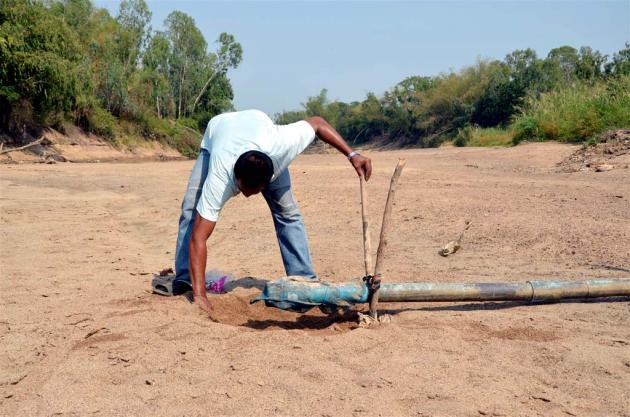More rainmaking launched as drought bites North Thailand after record floods
3 May 2012 (The Nation) – Prime Minister Yingluck Shinawatra presided over a meeting yesterday on water policies to speedily distribute water and launch the rainmaking operations and declared the Mae Wong Dam in Nakhon Sawan was necessary. Kitti Thupsri, technical specialist at the Phitsanulok rainmaking operation centre, said yesterday that since March the centre – covering seven lower northern provinces – had dispatched 137 rainmaking flights using 150 tonnes of chemicals which induced 32 days of rain and helped many farmers. However, as the drought becomes more severe farmers – especially those growing rice, corn, and sugarcane – are calling for more rainmaking operations. Kitti said the centre, that can send out two to three plane flights a day, yesterday dispatched aircraft to spray rain inducing chemicals in Tak, Phitsanulok and Khamphaeng Phetch. He said if the drought remained severe, the rainmaking operations would need to continue until October. Yingluck told the National Water Resources and Flood Policy Committee (NWFPC) meeting she would apply Chinese and Korean water management plans for Thailand’s use. She’d gained the information during her recent visits – especially a Korean idea for single command water management. She said many countries had offered to assist Thailand in solving floods though government-to-government Memorandums of Understanding, with no strings attached.
The PM said after the meeting the government had assigned the Interior Ministry to tackle drought by continuously distributing water for use and consumption to the affected areas. To help the agricultural sector, the government had ordered water released from dams, while the Department of Royal Rainmaking and Agricultural Aviation had been assigned to help the drought-hit area, and other agencies were looking for other water sources for farming. The PM said that the building of Nakhon Sawan’s Mae Wong Dam was necessary and officials were instructed to talk with villagers for understanding and to work out solutions together. Northern Region Dairy Cooperative President Wichien Inthachai lamented the region’s milk cows were so stressed from the hot weather they had yielded less milk since April. Citing his Mae Wang coop’s lowered produce from 900 cows to 12 tonnes from the usual 13 tonnes per day, he said farmers had installed sprinklers and added more drinking water to help cool the cows down. Uthai Thani residents are worried that the Sakae Krang River has dropped to unusual levels in the past five days affecting raft people. The Muang Uthai Thani waterworks has told the public it will lower tap water distribution pressure and turn off tap water supply from midnight to 4am everyday, until the drought is resolved. In Rayong’s Klaeng district some 100 farmers gathered in front of the Provincial City Hall, calling for help from Rayong Governor Seni Jittakasem to provide water for use and consumption – and to help the drought-affected fruit orchards in Thung Kwai Kin and Kongdin subdistricts. Thung Kwai Kin has 4,079 households of fruit farmers covering 3,824 rai of farmland. Seni said he would declare the areas drought zones in order to get budget to build ponds for fruit orchards and to have the district supply water for use and consumption and fix broken water pipes. For a long-term solution, the Royal Irrigation Department would propose Bt70million to change water pipes to standard size.
More rainmaking launched as drought bites in North

